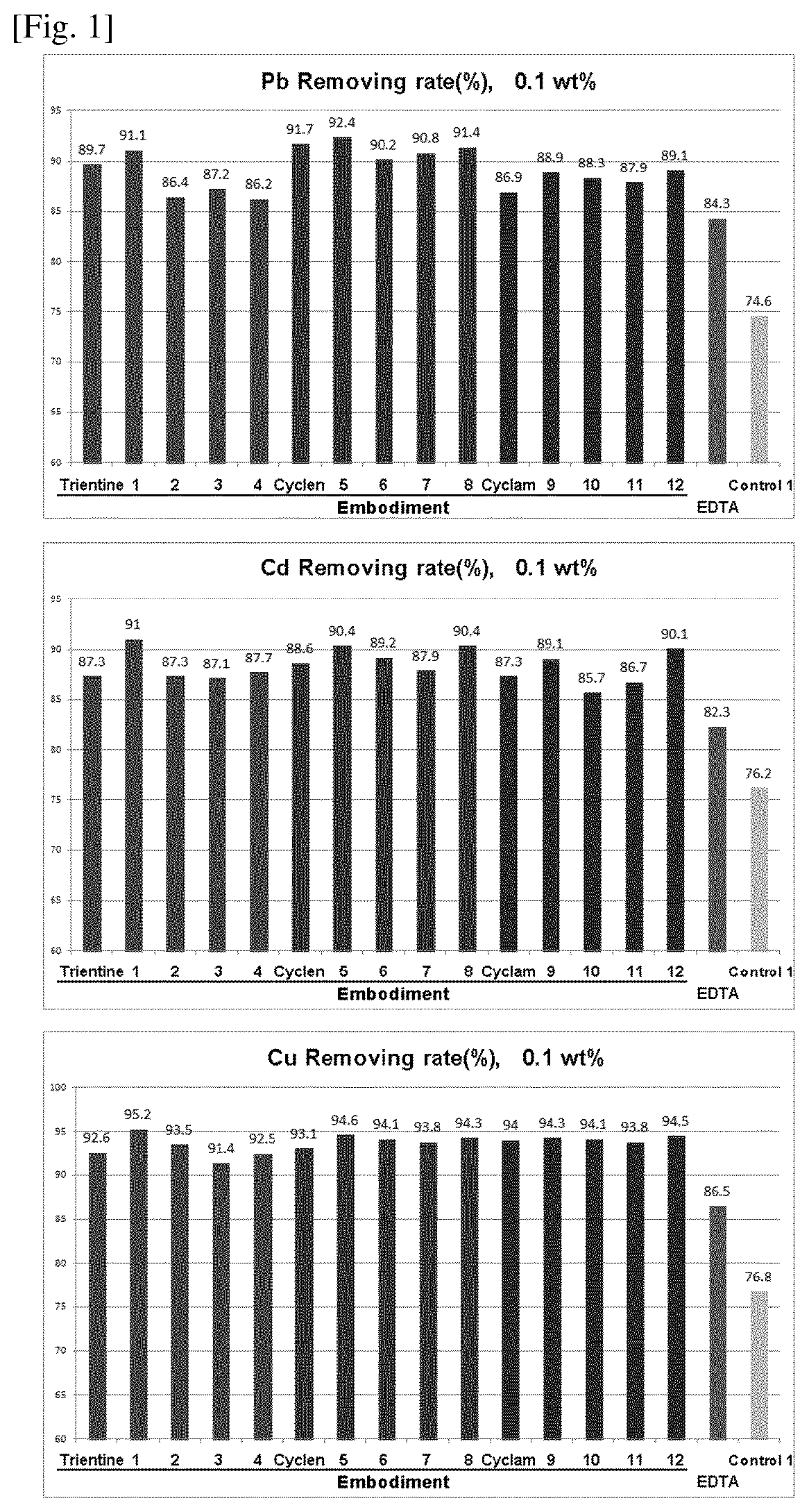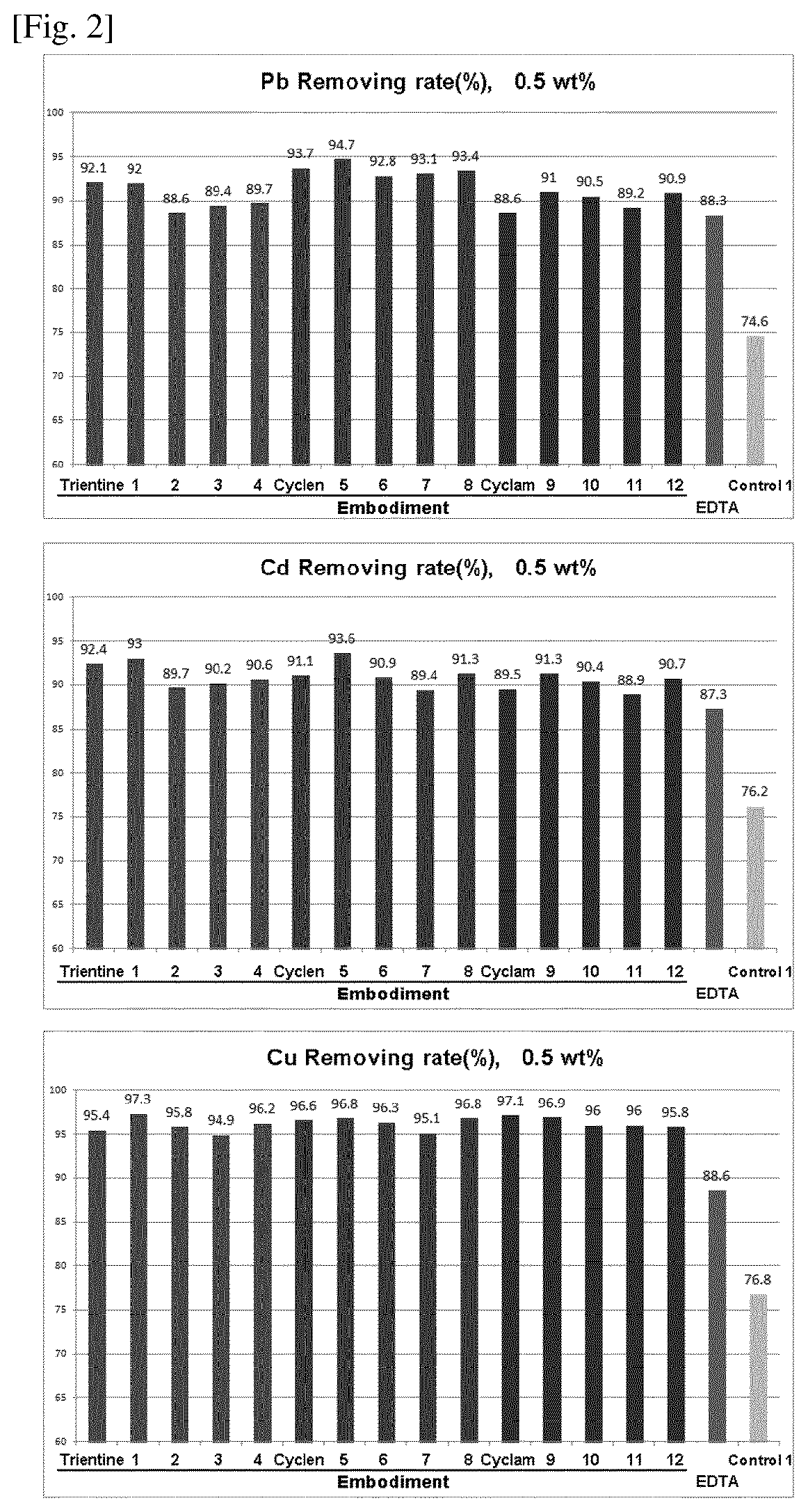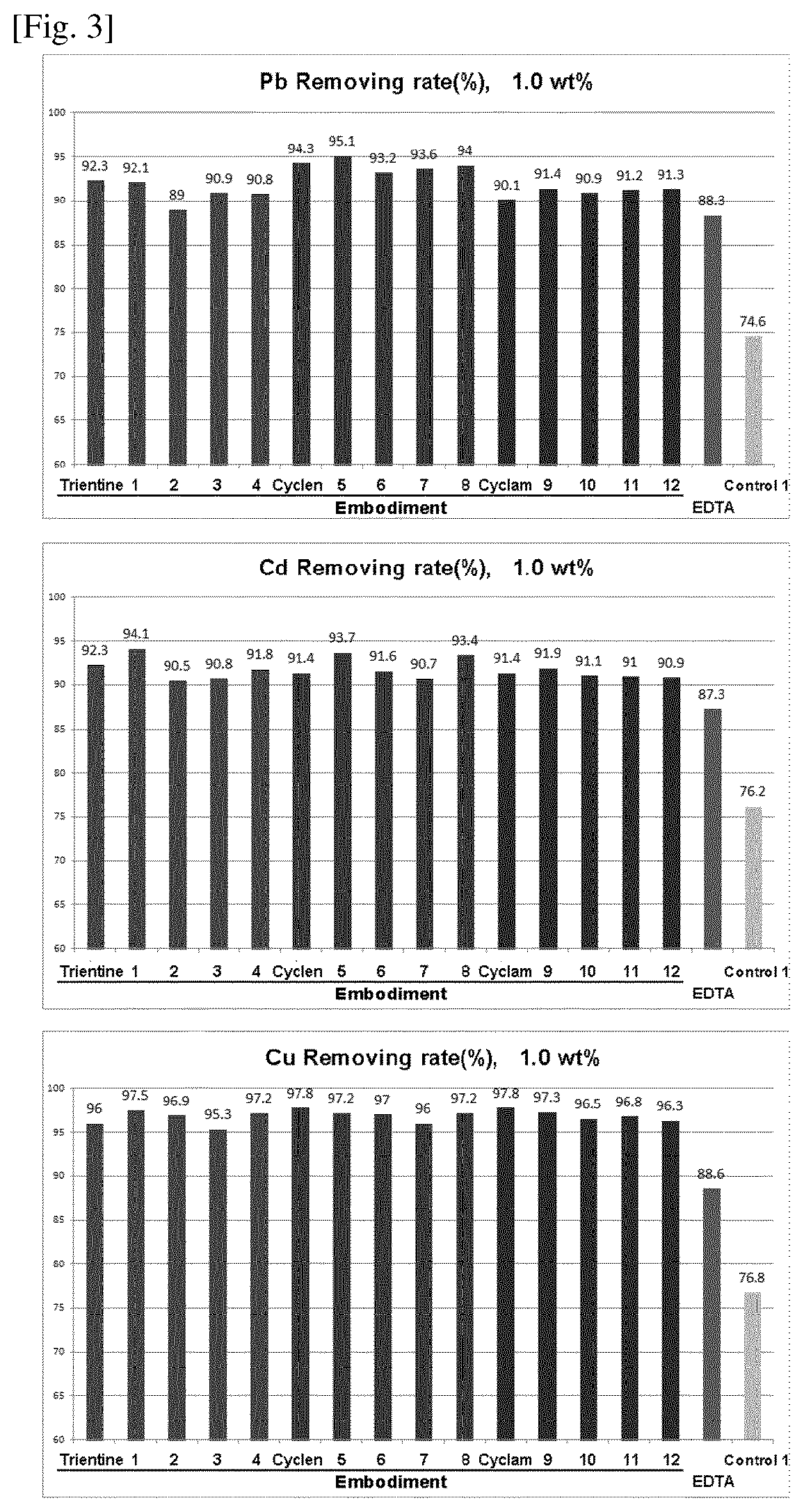Compositions for protecting the skin from heavy metals and formaldehyde
a technology of formaldehyde and compositions, applied in the field of compositions for protecting the skin, can solve the problems of air pollution getting worse, and achieve the effects of no or little skin irritation and toxicity, and strong heavy metal removal ability
- Summary
- Abstract
- Description
- Claims
- Application Information
AI Technical Summary
Benefits of technology
Problems solved by technology
Method used
Image
Examples
embodiment 1
Preparation of 3,6,9,12-tetrakis(carboxymethyl)-3,6,9,12-tetraazatetradecanedioic acid (Formula (1e))
[0061]
[0062]Triethylenetetramine (10.0 g) was dissolved in acetonitrile (ACN) (400 ml). K2CO3 (66.1 g) and ethyl bromoacetate (78.8 g) were added and reaction mixture was heated under stirring and under reflux for about 48 hours. After completion of the reaction, the reaction mixture was cooled to room temperature, and then filtered. A solid phase of the reaction mixture was discarded and the filtrate was concentrated under vacuum. Methylene chloride (MC) (200 ml) and purified water (300 ml) are added to the concentrate and stirred for 30 min, and then an organic layer is separated. The organic layer was treated with MgSO4, concentrated under vacuum, and then subjected to column purification with MC-methanol. 29.6 g of diethyl 3,6,9,12-tetrakis (2-ethoxy-2-oxoethyl)-3,6,9,12-tetraazatetradecanedioate was obtained (Yield: 64.8%).
[0063]1H NMR (CDCl3): 4.16 (q, 8H), 4.14 (q, 4H), 3.57 (...
embodiment 2
Preparation of 4,4′,4″,4′″-(((ethane-1,2-diylbis((4-carboxyphenyl)azanediyl))bis(ethane-2,1-diyl))bis(azanetriyl))tetrabenzoic acid (Formula (1f))
[0066]
[0067]Triethylenetetramine (10.0 g), ethyl 4-bromobenzoate (108.1 g), t-BuONa (46.0 g) and toluene (600 ml) were added, stirred, and then heated to 35° C. 50% (t-Bu)3P toluene solution (2.8 g) was added, stirred for about 30 min and then heated to 50° C. Pd(dba)2 (Bis(dibenzylideneacetone)palladium) (2.0 g) was added, heated under reflux. After completion of the reaction, the reaction mixture was cooled to room temperature. a purified water (1000 ml) was added, stirred for 30 min, and then an organic layer is separated. An aqueous layer of the reaction mixture was discarded. The organic layer was treated with MgSO4, concentrated under vacuum, and then subjected to column purification with MC-methanol. 22.9 g of tetraethyl 4,4′,4″,4′″-(((ethane-1,2-diylbis((4-(ethoxycarbonyl)phenyl)azanediyl)) bis(ethane-2,1-diyl))bis(azanetriyl))tetr...
embodiment 3
Preparation of 5,5′-((2-((5-carboxypyridin-3-yl)(2-((5-carboxypyridin-3-yl)(2-((5-carboxypyridin-3-yl)(2-carboxypyridin-4-yl)amino)ethyl)amino)ethyl)amino)ethyl)azanediyl)dinicotinic acid (Formula (1g))
[0071]
[0072]Triethylenetetramine (10.0 g), ethyl 5-bromonicotinate (108.5 g), t-BuONa (46.0 g) and xylene (600 ml) were added, stirred, and then heated to 35° C. 50% (t-Bu)3P toluene solution (2.8 g) was added, stirred for about 30 min and then heated to 50° C. Pd(dba)2 (2.0 g) was added, heated under reflux. After completion of the reaction, the reaction mixture was cooled to room temperature. a purified water (1000 ml) was added, stirred for 30 min, and then an organic layer is separated. An aqueous layer of the reaction mixture was discarded. The organic layer was treated with MgSO4, concentrated diethyl 5,5′-((2-((5-(ethoxycarbonyl)pyridin-3-yl)(2-((5-(ethoxycarbonyl)pyridin-3-yl)(2-((5-(e thoxycarbonyl)pyridin-3-yl)(2-(ethoxycarbonyl)pyridin-4-yl)amino)ethyl)amino)ethyl) amino)et...
PUM
 Login to View More
Login to View More Abstract
Description
Claims
Application Information
 Login to View More
Login to View More - R&D
- Intellectual Property
- Life Sciences
- Materials
- Tech Scout
- Unparalleled Data Quality
- Higher Quality Content
- 60% Fewer Hallucinations
Browse by: Latest US Patents, China's latest patents, Technical Efficacy Thesaurus, Application Domain, Technology Topic, Popular Technical Reports.
© 2025 PatSnap. All rights reserved.Legal|Privacy policy|Modern Slavery Act Transparency Statement|Sitemap|About US| Contact US: help@patsnap.com



